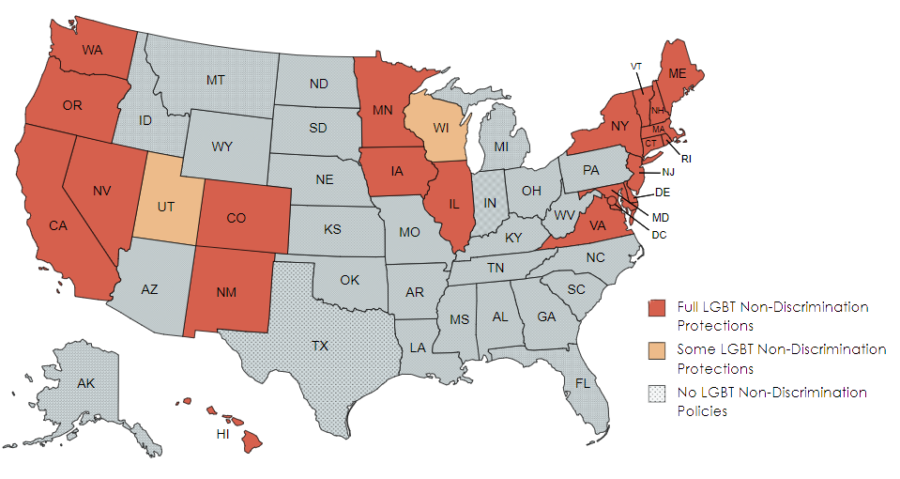Anti-LGBT laws spark controversy nationwide
According to Freedom For All Americans.org, in 29 states, LGBT Americans are not fully protected from discrimination on the basis of sexual orientation or gender identity. Virginia is one of 21 states with full LGBT non-discrimination protections in housing, employment, and public spaces such as schools.
April 15, 2022
From book bans to anti-LGBT legislation, a recent nationwide trend towards limiting LGBT rights has made headlines across the country. Florida’s controversial bill titled “Parental Rights in Education,” dubbed the “Don’t Say Gay” bill by opponents, was passed to give parents greater power over the material taught in public schools.
According to Find Law, this bill intends to restrict the instruction of sexual orientation or gender identity in kindergarten through third grade. It also prohibits classroom LGBT discussion in primary schools unless they are deemed “age and developmentally appropriate” according to state standards. Upon going into effect on July 1, parents will have the right to sue school districts for alleged violations.
“It’s not new for people to view LGBT things as inappropriate or sexual,” freshman Kai Vidanes said. “[The bill] is not sending a good message to kids. Being queer is a completely normal thing. It would be good for kids who are questioning their gender or sexuality to feel like they can explore that or that they’ll be supported.”
Lawmakers removed an amendment that required the school to inform the student’s parents or guardian if a teacher or staff member finds out about the student’s sexuality. Despite this change, opponents of this bill claim that it still stigmatizes the already marginalized LGBT students, which has concerned parents and teachers nationwide.
“As a community, it’s really wrong to blame people just because they might have been born a certain way,” freshman Aviva Loggia said. “Some kids have parents that are extremely unaccepting just because they like a certain person or certain gender. It’s about having an open, safe place to be like, ‘This is okay; this is who I am, [and] it’s okay to not know who I am.’”
In late February, Texas Gov. Greg Abbott ordered the Texas Department of Family and Protective Services to investigate parents who support gender-affirming care for their children. The order classifies procedures that help treat gender dysphoria, such as puberty blockers and hormone injections, as child abuse under state law. Doctors, teachers and parents could potentially face criminal penalties if they fail to report such “abuse” to state authorities.
“I find it really strange that there are a lot of actual child abuse cases in the world that aren’t getting the attention that they should, but for some reason, this is [the Texas government’s] main concern,” Vidanes said. “I think their priorities are really in the wrong place.”
Supporters of the bill draw on the claim that minors should not be making life-altering decisions such as irreversible hormonal treatments which carry medical risks, according to the New York Times. However, this has been criticized by health experts as something that should be left up to the patient, their parents and their doctors. According to Boston University Today, American Medical Association, among many other groups, has condemned states such as Texas for blocking transgender teens from receiving treatment.
“I believe withholding gender-affirming care is abusive,” senior Elise Engelen said. “Cisgender people should not be making decisions on a subject they know nothing about.”
Many families of trans children who rely on hormone prescriptions seek other options to protect their children, and some have crossed state lines to avoid the effects of the law. Access to mental health resources and proper counseling can be the support that LGBT teens need to feel safe and accepted at school.
“Honestly, I would say it’s better if we teach kids when they’re younger about [sexual orientation],” freshman Liam Weatherup said. “I’m from Kansas, and when I found out more about the LGBT community, I was like, ‘Oh, I’m not straight.’ It was really cool, and I was surprised that I didn’t know more about it.”
The percentage of youth identifying as part of the LGBT community increases every year. Between 2015 to 2019, the percentage of youth who identified as non-heterosexual increased 8.3% to 11.7%, according to U.S. News. Student organizations such as the Gender-Sexuality Alliance create a safe, welcoming place for LGBT students to make new friends and explore their identities.
Fairfax County Public Schools (FCPS) ensures rights and protections for transgender and gender-nonconforming students, ranging from the use of preferred pronouns to accessing school facilities that align with their gender identity, such as bathrooms and locker rooms. The nondiscrimination policy extended to sexual orientation as well on June 25, 2016, according to the Fairfax County Times.
“As long as I am confident in who I am and my identity, I don’t really care what other people think about it,” Vidanes said. “It’s much better to embrace yourself and be yourself than to have to feel trapped in someone that you’re not.”



